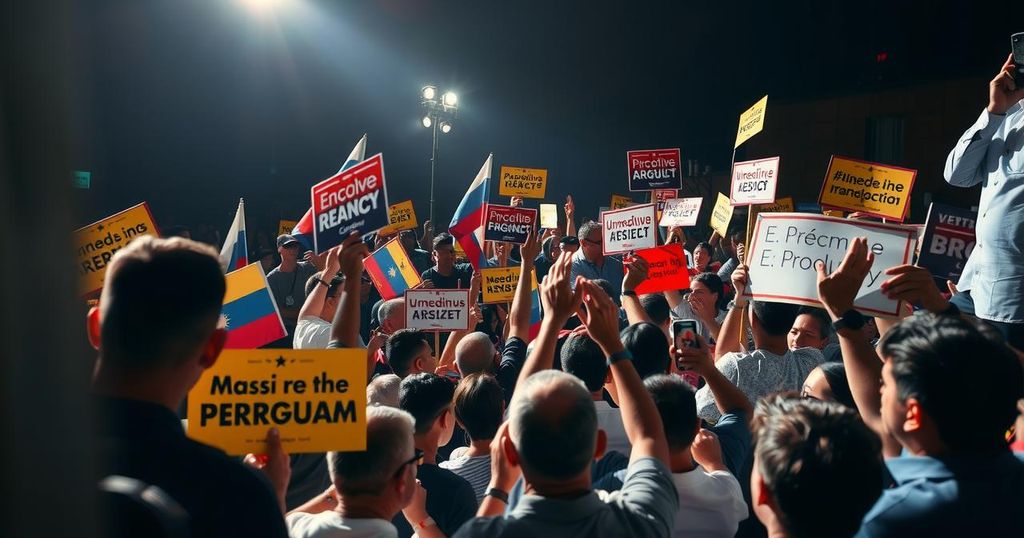Politics
2024 ELECTIONS, ALVARO DELGADO, BROAD FRONT, CANAL 10, CANAL 12, CIFRA, ELECTION, ELECTIONS, EQUIPOS CONSULTORES, FRENTE AMPLIO, JOSE, LUIS LACALLE POU, NATIONAL PARTY, OR, PEPE " MUJICA, PRESIDENTIAL CANDIDATES, REPUBLICAN, REPUBLICAN COALITION, SOUTH AMERICA, TRADE RELATIONS, URUGUAY, VOTER TURNOUT
Jamal Walker
0 Comments
Yamandu Orsi Leads in Uruguay’s Presidential Election, Signaling Political Shift
In Uruguay’s presidential election, leftist candidate Yamandu Orsi leads against National Party’s Alvaro Delgado, indicating a potential shift to the left after five years of conservative rule. Orsi secures approximately 49 percent of the vote, supported by former President Mujica, as issues of security remain paramount for voters. The election reflects changing political sentiments in a nation grappling with safety concerns. Uruguayan citizens showcase a strong commitment to their democratic responsibilities during this crucial electoral period.
In the recent presidential election in Uruguay, leftist candidate Yamandu Orsi of the Frente Amplio alliance emerged in a leading position, poised to defeat Alvaro Delgado of the National Party. This election marks a potential shift to the left after five years of conservative governance. In preliminary results, Orsi garnered approximately 49 percent of the vote, while Delgado received 46.6 percent, signaling a voter preference for change. The support of prominent figures, including former President Jose “Pepe” Mujica, has significantly buoyed Orsi’s campaign.
Voting in the second round of the election, Uruguayan citizens expressed their desire for increased security and stability, reflecting concerns that have persisted over the past five years. While Mujica acknowledged his advancing age, he emphasized his hope for the younger generation’s future, stating that it was vital to focus on their prospects. Both candidates made efforts to foster a sense of camaraderie even amid the tight competition, utilizing traditional elements of Uruguayan culture, such as sharing mate, to sustain relations.
The political landscape in Uruguay has seen fluctuations, with the Frente Amplio coalition historically breaking the conservative domination in 2005 and holding leadership for three consecutive terms until 2020 when the National Party regained control. The persistent issues of crime and insecurity dominate the electorate’s concerns as they navigate the implications of their electoral choices. With voting being compulsory, the citizenry demonstrated their commitment to participation, emphasizing the importance of a stable and responsive government.
Yamandu Orsi’s projected victory in Uruguay’s presidential election encapsulates a broader struggle between leftist and conservative ideologies following years of center-right administration. The electoral landscape has shifted significantly since 2005, when the leftist Frente Amplio coalition first gained power, succeeding in implementing progressive social measures. However, a resurgence of the National Party can be attributed to rising crime rates and public concerns regarding safety. As Uruguay navigates these challenges, the outcome of this election stands as a critical juncture for its political future.
The presidential election in Uruguay signals a possible return to leftist governance after significant voter discontent with the former center-right administration. As Yamandu Orsi leads in the polls, the implications of this election reach beyond mere political shifts, reflecting deep-seated concerns amongst citizens about safety and the direction of national policy. The engagement and participation of the electorate in this compulsory voting environment demonstrate a commitment to democratic values and highlight the importance of responsive governance in addressing pressing societal issues.
Original Source: www.france24.com




Post Comment